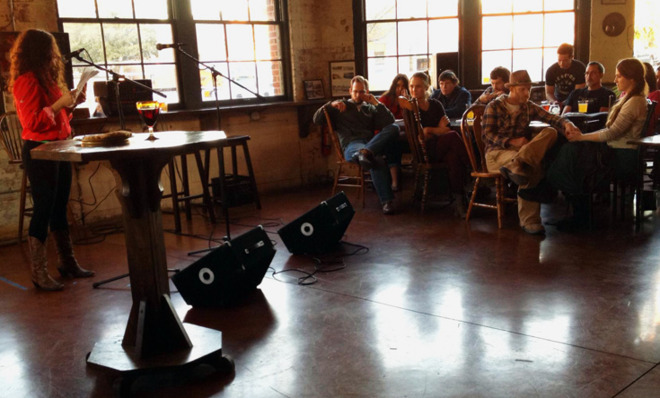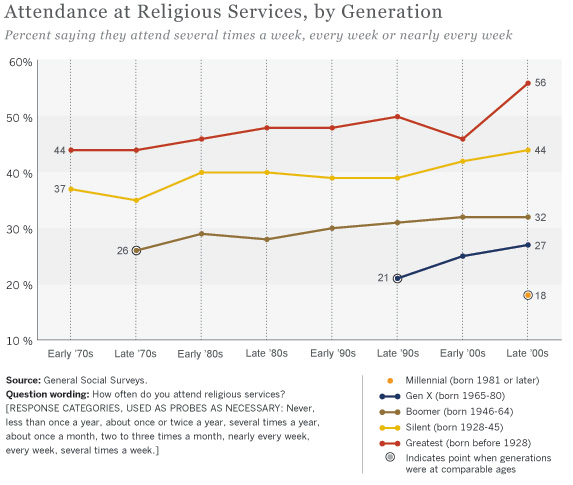Why craft beer won't lure millennials to Christianity
The Church-in-a-Pub sounds fun. But it probably won't change how young people feel about organized religion.

A free daily email with the biggest news stories of the day – and the best features from TheWeek.com
You are now subscribed
Your newsletter sign-up was successful
Millennials are by far the least religious generation in America today. According to Pew Research, millennials are less likely than any other demographic to be affiliated with a religion, to strongly believe in religion's teachings, or to pray. And they certainly don't like attending church.

So what to do when millennials aren't exactly filling the pews? For some congregations, the answer is to make church as un-church-like as possible.
Hence the Church-in-a-Pub, located in Fort Worth, Texas, where (mostly) young people gather at a brewpub to drink craft beer, eat pizza, and, yes, even take communion. For most of the people who attend, according to NPR, this isn't a supplement to Sunday service — this is it.
The Week
Escape your echo chamber. Get the facts behind the news, plus analysis from multiple perspectives.

Sign up for The Week's Free Newsletters
From our morning news briefing to a weekly Good News Newsletter, get the best of The Week delivered directly to your inbox.
From our morning news briefing to a weekly Good News Newsletter, get the best of The Week delivered directly to your inbox.
It has been so successful that the region's Evangelical Lutheran Church council declared it an official worshipping community, with plans to expand to other bars in the Forth Worth area.
"I think the institutional church now is getting onboard," Pastor Philip Heinze told NPR, "because there's a lot of anxiety frankly about the church's decline and they're trying to think outside of that institutional box."
A similar trend is occurring at Beer & Hymns, a monthly event held at Oregon's First Christian Portland. And in Williamsburg, Brooklyn, the millennial hipster Holy Land, full religious services are held every Sunday at two longtime neighborhood watering holes, Trash Bar and Pete's Candy Store.
On Monday nights at nearby Union Pool, Rev. Vince Anderson — who originally studied to be a Methodist minister — regularly draws big crowds with his rowdy gospel songs.
A free daily email with the biggest news stories of the day – and the best features from TheWeek.com
As a child, I regularly attended Catholic Mass. I have also randomly wandered into one of the Rev. Vince Anderson's shows. It's pretty clear that one is more fun than the other — specifically, the one that involves drinking beer.
But a boozy show is unlikely to lead too many youngsters back into the fold, largely because a) there are plenty of opportunities to drink delicious craft beer without being preached to and b) millennials leave the Church for many reasons, but its lack of "hipness" usually isn't one of them.
Even some young people who identify as Christian don't think being "edgy," at least by traditional Christian standards, will attract millennials. Evangelical Christian Rachel Held Evans argued on CNN against the idea that the "key to drawing twenty-somethings back to church is simply to make a few style updates." Christianity's problems, she wrote this summer, go much deeper:
Many of us, myself included, are finding ourselves increasingly drawn to high church traditions — Catholicism, Eastern Orthodoxy, the Episcopal Church, etc. — precisely because the ancient forms of liturgy seem so unpretentious, so unconcerned with being “cool,” and we find that refreshingly authentic.
What millennials really want from the church is not a change in style but a change in substance. We want an end to the culture wars. We want a truce between science and faith. We want to be known for what we stand for, not what we are against. [CNN]
In other words, organized religion has become heavily politicized, and no craft IPA or guitar solo is going to change that. This view, to some extent, is supported by none other than the Pope, who warned against focusing exclusively on divisive social issues at the expense of traditional Catholic priorities like helping the poor.
Vern Bengtson, sociology professor at the University of Southern California, agreed that conservative firebrands have scared some potential churchgoers away.
In Salon, citing research from his book, Families and Faith: How Religion Is Passed Down Across Generations, he claimed that "the political right has become so identified with a conservative religious agenda that it has alienated moderates who consider organized 'religion' a synonym for an anti-gay, anti-abortion, pro-civic religion agenda."
The answer to organized religion's problems probably won't be found at the bottom of a pint glass — no matter how good the beer is.
Keith Wagstaff is a staff writer at TheWeek.com covering politics and current events. He has previously written for such publications as TIME, Details, VICE, and the Village Voice.